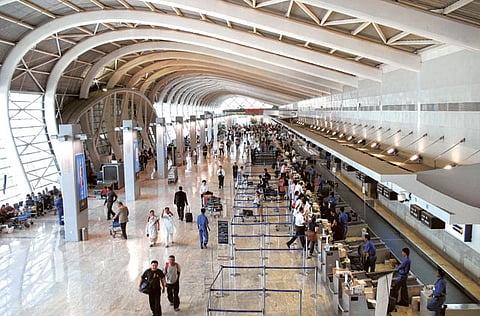India-UAE flights: Anxious residents flood travel agents with calls on PCR test, passenger eligibility, quarantine rules
Indian expats awaiting return to the UAE have several questions

Dubai: A day after Dubai announced an easing of travel protocols for the return of stranded UAE residents from select countries, travel agents said they have been flooded with calls by potential passengers seeking greater clarity on their eligibility and PCR test rules.
Afi Ahmed of Smart Travels told Gulf News, “There is a lot of excitement among UAE residents who are stuck overseas after the announcement on the revised travel rules. However, there is also a lot of confusion. They want clarifications on a number of questions.”

He said enquiries he was receiving were many. “People want to know if GDRFA approval is needed for entry? What about quarantine requirements? Can residents from other emirates proceed home on arrival? What about those whose visas had recently expired? What is the criteria for children who were not earlier eligible to take vaccines? Which are the approved vaccines? What if someone had taken only one vaccine? And so on.”
Ahmed said, “As travel agents, we are also awaiting clarity on some of these questions. Ticket issuance has not picked up in a big way yet as people want a confirmation on many of these issues.”
Kochi-Dubai flight at Dh855
He said India-Dubai flights had opened up on a number of sectors with tickets starting at around Dh850.
“A Kochi to Dubai flight on June 24 for example costs Dh855, while a flight from Calicut to Dubai on June 25 costs Dh879,” he said, but added that many residents are still looking for answers to their questions.
Rashida Zahid, Senior Operations Manager at Musaffir.com, said, “We are awaiting clarity from the airlines. Among the many questions that passengers are asking is whether families travelling together need to go in for institutional or home quarantine?

Albert Fernando of Travelwings said, “There are a lot of UAE residents who are abroad and are anxious to return."

According to him, one of the most common questions before them is what vaccines are approved by the UAE.
What we know so far about the new UAE travel protocol
On Saturday, the Supreme Committee of Crisis and Disaster Management in Dubai announced updates to Dubai’s travel protocols for inbound passengers from South Africa, Nigeria and India, effective from June 23.
The updates were aimed at protecting passengers without compromising on COVID-19 precautionary measures.
India-UAE flights
According to Dubai Media Office, only passengers with a valid residence visa who have received two doses of a UAE-approved vaccine, are allowed to travel to Dubai from India. They should also present a negative test certificate from a PCR test taken 48 hours before departure; UAE nationals are exempted from this requirement. Only QR-coded negative PCR test certificates are accepted.
The new protocol also said passengers from India are required to undergo a rapid PCR test four hours prior to departure to Dubai. They must also undergo another PCR test on arrival in Dubai. In addition, following arrival, passengers from India should undergo institutional quarantine until they receive their PCR test result, which is expected within 24 hours. UAE citizens and diplomats are exempted from institutional quarantine.
Travel from South Africa, Nigeria
The new protocols allow travellers from South Africa, who have received two doses of a UAE-approved vaccine to enter Dubai. Passengers must present a negative result from a PCR test taken within 48 hours before departure to Dubai; UAE nationals are exempted from this PCR test requirement. Passengers must also undergo a PCR test on arrival in Dubai. Transit passengers should comply with entry protocols of final destinations.
For travellers from Nigeria, passengers must present a negative test result for a PCR test taken 48 hours prior to departure; UAE citizens are exempted from this requirement. The negative PCR test certificate should carry a QR Code and the test must have been conducted by labs approved by the Nigerian Government. Passengers must also undergo a PCR test on arrival in Dubai. Transit passengers should comply with entry protocols of final destinations.
The Supreme Committee of Crisis and Disaster Management said “the updated travel protocols are part of a regular process of revising and optimising precautionary measures based on the latest local, regional and international developments.”
They are also aimed at enabling the city to continue serving as a global commercial hub and a bridge for travel and trade between the east and west, Dubai Media Office said .
Sign up for the Daily Briefing
Get the latest news and updates straight to your inbox






